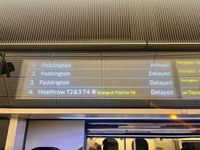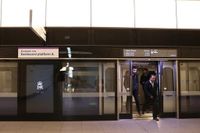Commuters faced significant travel disruptions on the Elizabeth line this morning, April 22, 2025, as planned engineering works ran over schedule, causing chaos for those returning to work after the bank holiday weekend. Severe delays were reported between Heathrow Terminals T4 and T5 and Abbey Wood, as well as between Reading and Abbey Wood. Minor delays also affected the stretch between Stratford and Shenfield.
Transport for London (TfL) confirmed the delays, stating, “Severe delays between Paddington and Heathrow terminals/Reading due to a late finish of engineering work.” While the rest of the Elizabeth line operated with a good service, the issues left many commuters frustrated and scrambling for alternative routes.
One commuter, who arrived late to work because of the disruptions, expressed his exasperation, saying, “It just means everything is now delayed and I’ve had a rushed and stressful morning. If the Elizabeth line isn’t delayed, it’s closed for engineering works. It’s ridiculous. Sadiq Khan needs to get a grip of the situation.”
Another passenger, who spends three hours commuting within London each day, shared his ordeal. He had to take a different route to work from West Drayton to Greenwich due to the Elizabeth line issues. He lamented, “Public transport in the outer boroughs is a joke. If it’s not the trains giving me grief, it’s the buses. I despair on an almost daily basis.”
Frustrations spilled over onto social media, with users voicing their complaints about the Elizabeth line’s reliability. One commuter tweeted, “First day back to work after a bank holiday so naturally the Elizabeth line is up the spout.” Another added, “Can’t they lower their expectations or something because this is ridiculous.”
But the Elizabeth line wasn’t the only service experiencing difficulties today. The Northern line was suspended between Kennington and Camden Town, with minor delays reported on the rest of the line. Additionally, the Bakerloo and Central lines faced slower-than-usual service due to train cancellations. The Weaver Overground line was also out of action between Enfield Town and Hackney Downs, with Network Rail engineers on-site fixing a fault with the overhead power lines.
As commuters attempted to navigate the chaos, the Elizabeth line’s issues were compounded by minor delays on the Jubilee and Metropolitan lines, both caused by an earlier trespasser on the track at Neasden. Commuters were left wondering how such disruptions could occur on a day when many were returning to work after the Easter break.
While the delays on the Elizabeth line were expected to last until at least 11:00 AM, the overall impact on London’s transport system was felt widely. Trains running between London Paddington and Heathrow/Reading via the Elizabeth line, Great Western Railways, and Heathrow Express services faced cancellations, revisions, or delays of up to 20 minutes. The disruption was anticipated to persist until 9:30 AM.
In addition to the issues on the Tube, serious delays were reported on the A13 Newham Way (Westbound) between East India Dock Road and Beckton Road, with slow-moving traffic creating long queues. The A2 near Gravesend also faced severe delays, particularly around the Dartford Crossing, where traffic was heavily impacted despite all lanes being reopened.
In light of the travel chaos, commuters are left to wonder about the efficiency of London’s transport system and the reliability of the Elizabeth line, which has faced scrutiny in recent months. As one commuter put it, “For info Elizabeth line knock on delays, likely to get worse as the morning goes on.”
The ongoing disruptions highlight the challenges faced by Transport for London as it manages essential engineering works while trying to maintain service reliability for its users. With the first rush hour after a bank holiday proving particularly problematic, many are calling for better planning and communication from TfL to prevent such issues in the future.
As commuters adapt to the changes and seek alternative routes, they remain hopeful for improvements in the service. With the Elizabeth line being a crucial part of London’s transport network, its reliability will be vital for the city’s commuters in the months to come. The frustrations experienced today may serve as a catalyst for necessary changes in how London’s transport services are managed.







